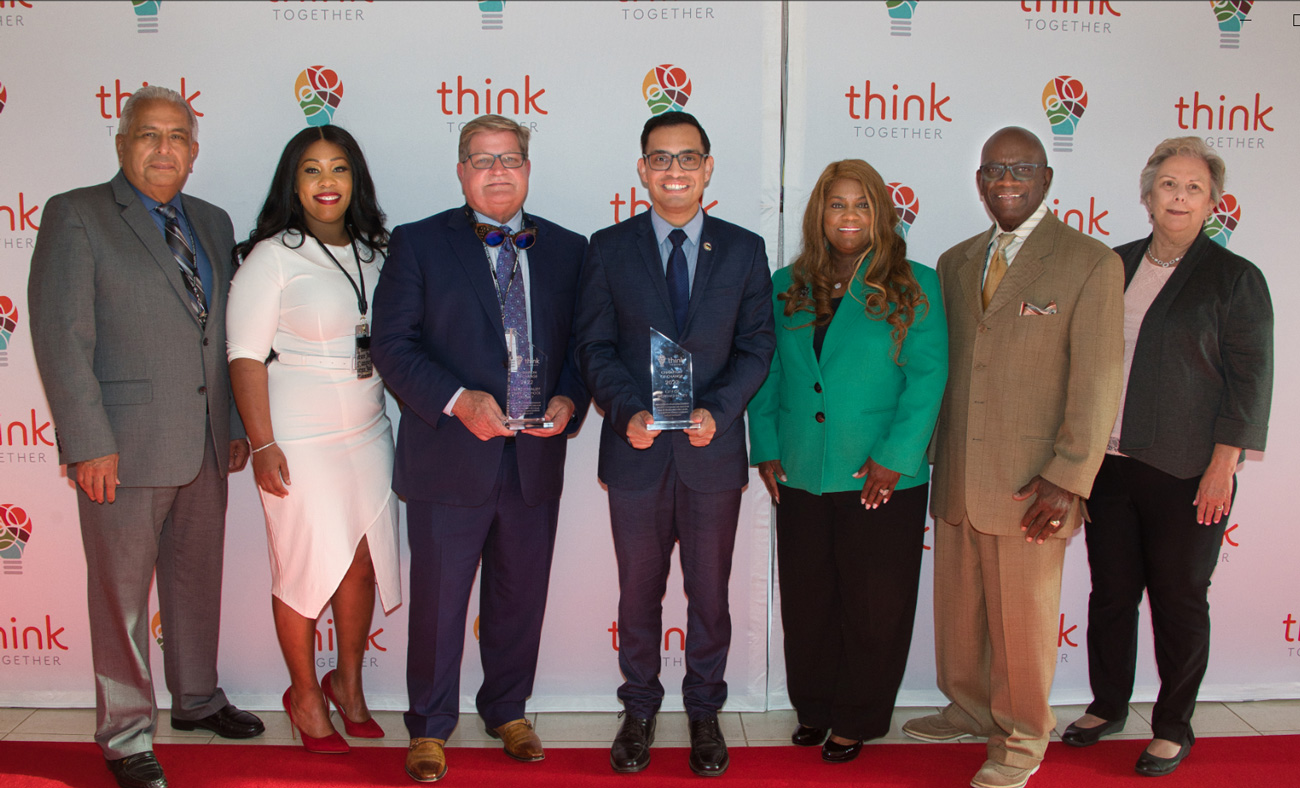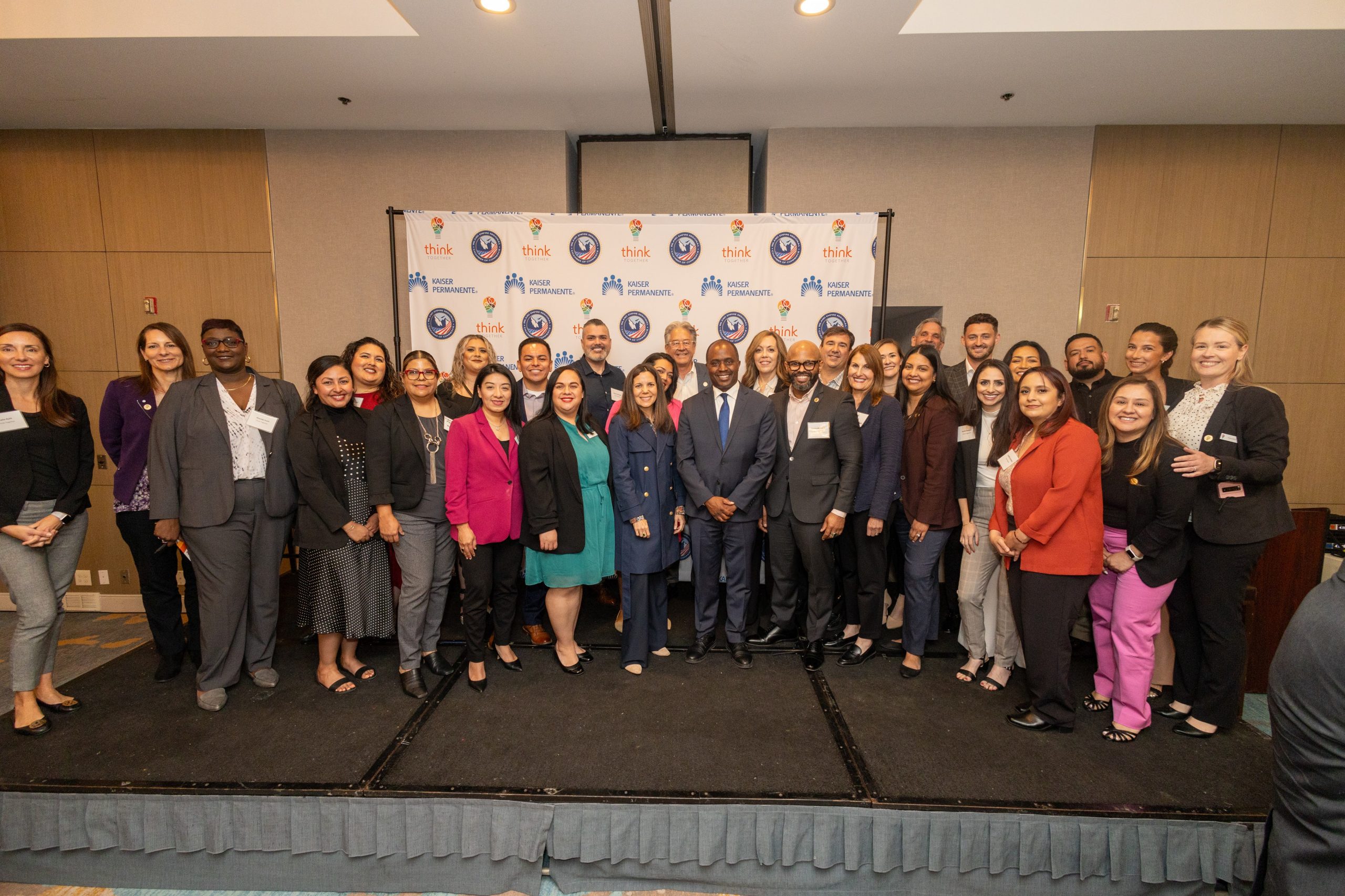Education
Think Together Awards City of Moreno Valley and Moreno Valley USD at Annual Raise A Hand Fundraiser

Think Together Honors City of Moreno Valley and Moreno Valley Unified School District with Champion of Change Award at Annual Raise A Hand Event
Think Together partners with the City of Moreno Valley and Moreno Valley Unified School District to provide afterschool and expanded learning programs to nearly 6,000 students annually.
Think Together, California’s largest nonprofit provider of afterschool, expanded learning, and school improvement programs, is proud to announce it has named the City of Moreno Valley and Moreno Valley Unified School District as this year’s Champion of Change award recipients at its annual Raise A Hand fundraiser event held on Thursday, April 21.
This year’s event returned as a live broadcast with more than 300 guests attending watch parties in Orange County, the Inland Empire, Coachella Valley, and the Bay Area and raised over $500,000 to date for K-12 expanded learning and afterschool programs that enrich the school day and bring equitable education opportunities to students throughout the state.
“Think Together is so impressed with the leadership and collaboration the City of Moreno Valley and Moreno Valley Unified foster to serve students in their community,” said Think Together Founder and CEO Randy Barth. “When new investment opportunities or program innovations become available, they’re the first to lead the way, trailblazing new programs that support student learning and inspiring others to do the same.”
When schools rolled out distance-learning to keep communities safe during the COVID pandemic, Think Together worked with the City of Moreno Valley and the Moreno Valley Unified School District to offer virtual expanded learning programs to students so they could stay connected with peers and program leaders in an educational environment.
As schools began to welcome students back on campus last year, the City and the District were among the first to partner with Think Together to augment their existing After School Education and Safety (ASES) and 21st Century Community Learning Centers grants with newly available Expanded Learning Opportunities Program (ELO-P) funds to offer expanded learning programs to more students and during non-instructional days, like summer and spring break.
“When we began our work together more than ten years ago, I knew as an educator this partnership had real potential to make a difference in the lives of students,” said Dr. Yxstian Gutierrez, Mayor of Moreno Valley. “There’s no greater investment than the one you can make in the future of our students, and this one has been no exception. It is an invaluable asset for our community.”
Since partnering with the City of Moreno Valley and the Moreno Valley Unified School District, Think Together has served an estimated 50,000 students with afterschool and expanded learning programs. In 2022 alone, programs reached an estimated 6,000 students and have evolved to serve youth and their families with academic enrichment, physical activity, and social-emotional learning, helping to provide a safe place for kids during typical working hours for caregivers.
Think Together was founded in 1997 as a single afterschool center in Costa Mesa and has since grown to serve nearly 200,000 students annually with direct-to-student and professional development programs throughout the state.
“We’re honored to be recognized alongside the City of Moreno Valley for the work we’re doing to help students outside of the school day,” said Moreno Valley Unified School District Superintendent Dr. Martinrex Kedziora. “These programs make a real difference in the lives of students and their families, and this recognition validates the work we’re proud to do every day as educators.”
Think Together also awarded its Faces of the Future Scholarship Award to three outstanding students who were enrolled in Think Together’s program. Recipients received a $2,000 scholarship and a laptop to start their college career.
A replay of Think Together’s Raise A Hand virtual broadcast can be viewed on YouTube. Sponsored by the Worah Family Foundation, the event brought together passionate individuals and corporations throughout California to celebrate 25 years of impacting students through afterschool and expanded learning.
Education
California State Superintendent Tony Thurmond Inspires at Inland Empire Education and Workforce Summit

Resilience and Readiness: Navigating Post-Pandemic Challenges at the Inland Empire Education and Workforce Summit
In an effort to address the lingering impacts of the pandemic on education and workforce readiness, the fourth annual Inland Empire Education and Workforce Summit took place at the Ontario Airport Hotel and Conference Center on April 24. This year’s event, organized by Think Together in collaboration with the Inland Empire Regional Chamber of Commerce, saw a packed house of educators, business leaders, and elected officials.
The summit kicked off with an insightful presentation by Dr. Alex McDonald from Kaiser Permanente, shedding light on the intersection of healthcare, education, and workforce development. Sponsored by Kaiser Permanente, the summit underscored the importance of initiatives that enhance overall community well-being while supporting academic success.
Randy Barth, Founder and CEO of Think Together, set an inspiring tone by introducing Jusbith Aguayo, a student speaker from Eisenhower High School, who shared her personal journey and highlighted the significant impact of educational support programs on students’ lives. Aguayo’s testimony emphasized the transformative power of education and community collaboration in overcoming barriers to success, especially in the face of unprecedented challenges brought about by the pandemic.
Following Aguayo’s heartfelt speech, Barth led an expert panel comprising leaders from education, workforce development, and healthcare sectors. Dr. Angelo Farooq, Dr. Carol Tsushima, Dr. Scott Price, Dr. Douglas Mack, and Connie Leyva engaged in discussions centered on preparing students for success in the workforce amidst the ongoing challenges exacerbated by the COVID-19 crisis.
A highlight of the summit was the keynote address delivered by California State Superintendent of Public Instruction, Tony Thurmond. Thurmond emphasized the critical importance of equitable access to quality education and stressed the necessity for sustained collaboration among educators, policymakers, and community stakeholders. His address resonated deeply with attendees, underscoring the collective commitment to ensuring the success and prosperity of students across the Inland Empire.
Thurmond capped off the event, commending the efforts to bridge the gap between school-day learning and future success through afterschool programs that expose students to career-ready experiences. He emphasized the importance of investments in apprenticeship programs, paid internships, and workforce readiness initiatives to ensure students are equipped with the skills needed to thrive in the real world.
For more information about Think Together and their impactful programs, visit www.thinktogether.org. Additionally, to learn more about the Inland Empire Regional Chamber of Commerce and its efforts to support commerce and economic growth, visit www.iechamber.org.
Education
Unlocking Potential: Fostering Inclusion and Innovation through Entrepreneurial Education at REAL Journey Academies

The REAL Journey Academies Entrepreneur High School Model / Inclusive Education Programming
Inclusive education is a fundamental right for all students. REAL Journey Academies was founded on this principal. The unique high school programs of Entrepreneur High Schools in Fontana and San Bernardino integrate entrepreneurship and career & technical education (CTE) to offer a unique opportunity to unlock the potential of students and prepare them for success in the constantly evolving century workforce. By providing tailored support, fostering self-confidence, and nurturing entrepreneurial skills, our unique high school program empowers students with IEPs and hidden talents to thrive academically, professionally, and personally.
This white paper explores the values of our entrepreneurship focused high school program for students with IEPs and hidden talents, highlighting the program’s potential to promote inclusion, boost self-esteem and cultivate a culture of innovation and entrepreneurship. The value proposition of our programming, in relationship to inclusive education, include:
- Promoting Inclusion:
- Our entrepreneurship focused program focuses on full inclusion by providing students with diverse learning needs, including those with IEPs and hidden talents, with opportunities to actively participate in hands-on, experiential learning experiences.
- By embracing diversity and fostering a sense of belonging, the entrepreneurship focused program of REAL Journey Academies empowers all students to realize their full potential and become active members of their communities.
- Boosting Self-Esteem:
- Entrepreneurship focused programming at its core boost self-esteem and confidence by recognizing and celebrating students’ individual strengths, interests, and talents.
- Through project-based learning and real-world experiences, students in an Entrepreneur High School have the opportunity to showcase their skills, gain recognition for their achievements, and build a positive sense of self-worth.
- Our program is designed to give students the support and encouragement they need to overcome challenges, set ambitious goals, and pursue pathways to success that align with their unique abilities and aspirations.
- Cultivating a Culture of Innovation:
- Our entrepreneurship focused program cultivates a culture of innovation by encouraging students to think creatively, problem-solve collaboratively, and pursue their entrepreneurial dreams.
- By providing students with the tools, resources, and mentorship they need to explore their passions and develop their talents, the unique Entrepreneur High School Program is designed to inspire a lifelong love of learning and skills associated entrepreneurship.
- Through extensive work-based learning experiences and real-world projects, Entrepreneur High School students have the opportunity to unleash their creativity, tap into their potential, and make meaningful contributions to society.
The REAL Journey Academies’ entrepreneurship focused high school program has immense value for all students, including those with IEPs and hidden talents. By promoting inclusion, boosting self-esteem, and cultivating a culture of innovation, at its foundation our program is designed to empower students to overcome barriers, fulfill their potential, and pursue their dreams. As we strive to build a more equitable and inclusive society, investing in developing entrepreneurial skills in students with diverse learning needs is not only a moral imperative but also a strategic investment in our collective future
Business
IE Chamber and AmCham Peru Forge Strategic Partnership for Business and Youth Development

Building Global Bridges: IERCC and AmCham Peru Unite for Cross-Continental Business Growth and Youth Empowerment
On December 12, 2023, a landmark event unfolded as the Inland Empire Regional Chamber of Commerce (IERCC) took a significant step in expanding its international influence by forging a strategic partnership with The American Chamber of Commerce (AmCham) Peru. In a meeting that symbolized the dawn of a new era in cross-continental collaboration, Eddy Sumar, MBA, CCE, CICE, an esteemed member and Chair of Education and Youth Skills Development at IERCC, presented Mr. Aldo R. Defilippi, the Executive Director of AmCham Peru, with the Certificate of Honorary Global Member.
This partnership marks IERCC’s foray into the Latin American continent, signifying a major stride in its mission to build collaborative networks that facilitate market entry and growth for US and Peruvian companies. IERCC President and CEO Edward Ornelas, Jr. commented on this milestone, stating, “This partnership with AmCham Peru is a significant achievement for IERCC. It represents our dedication to fostering international business relations and our commitment to the growth of businesses in both regions. We are excited to embark on this journey, offering our members unprecedented access to new markets and opportunities.”
The collaboration between IERCC and AmCham Peru is set to open new avenues for businesses in both regions. It will enable members of AmCham Peru to tap into the vast resources and connections that IERCC offers, thereby facilitating smoother market entry and business expansion.
A key focus of the partnership is the development of youth and education programs. During the meeting, Mr. Aldo R. Defilippi was introduced to various initiatives led by IERCC aimed at empowering young entrepreneurs and business leaders of tomorrow. Further emphasizing this commitment, Mr. Defilippi received a copy of “The Hidden Dreams,” authored by Eddy Sumar, which explores the importance of identifying and pursuing the aspirations of young individuals.
Mr. Ornelas, Jr. further elaborated on the significance of this aspect, stating, “Our focus on youth and education is a testament to our belief that the future of business lies in the hands of the next generation. By aligning with AmCham Peru, we are not just expanding our business network, but also cultivating a fertile ground for young minds to grow, innovate, and lead.”
IERCC’s partnership with AmCham Peru is a forward-thinking move, indicative of its commitment to nurturing a global business community that supports both immediate business interests and long-term developmental goals. This collaboration is set to be a beacon of innovation, growth, and shared success, benefiting businesses and young leaders in both the United States and Peru.
As the Inland Empire business community looks on, the IERCC and AmCham Peru collaboration promises to usher in a new era of international business cooperation, bridging continents and cultures for mutual prosperity.
-

 Opinion1 month ago
Opinion1 month agoSurge in Unemployment Among California Youth Linked to Minimum Wage Hikes
-

 Commercial Real Estate Transactions3 weeks ago
Commercial Real Estate Transactions3 weeks agoSRS Real Estate Partners Announces Record-Breaking $6.15 Million Ground Lease Sale of a New Construction Chick-fil-A Property in Murrieta, California
-

 Health & Wellness3 weeks ago
Health & Wellness3 weeks agoBuddha Bars: A Mother’s Innovative Solution to Healthy Snacking
-
By Press Release1 week ago
California Employment Expansion Continues But Still Trails Nation




